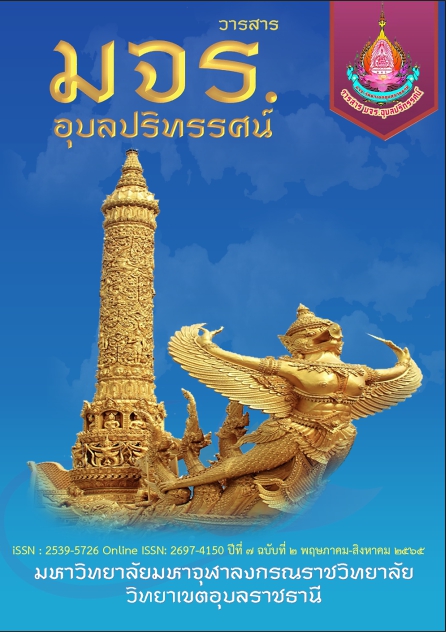SOFT SKILLS OF THE ADMINISTRATORS AFFECTING EFFECTIVENESS OF MEDIUM SCHOOLS UNDER THE SECONDARY EDUCATIONAL SERVICE AREA OFFICE NONG KHAI
Main Article Content
Abstract
The purposes of this research were 1) to study the Soft Skills level of educational institute administrators. medium school, 2) to study the effectiveness of medium schools according to the teacher's opinion, 3) to study the relationship between Soft Skills of school administrators and the effectiveness of medium schools, and 4) to create a forecasting equation for soft skills of educational institution administrators affecting the effectiveness of medium schools. This research is a quantitative research. The samples were teachers in 217 persons under the Secondary Educational Service Area Office Nongkhai were obtained by simple random sampling. The research instrument was a scale questionnaire with 5 levels of estimation. The confidence value of the Soft Skills questionnaire of the school administrators was .954 and the effectiveness of the medium school was .960 under the Secondary Educational Service Area Office Nongkhai. The data were analyzed by frequency, percentage, mean, standard deviation. Finding the Pearson Correlation Coefficient and stepwise multiple regression analysis. The results of the research showed that 1) Soft Skills of school administrators medium school under the Secondary Educational Service Area Office Nongkhai Overall and each aspect is at a high level. 2) Effectiveness of medium schools under the Secondary Educational Service Area Office Nongkhai overall and in each aspect at a high level.
3) Soft Skills of School Administrators and the Effectiveness of Medium Schools under the Secondary Educational Service Area Office Nongkhai have a positive relationship statistically significant at the .01 and .05 levels. 4) Multiple Regression Analysis of Soft Skills of School Administrators Affecting medium School Effectiveness under the Secondary Educational Service Area Office Nongkhai, Soft Skills of the school administrators were predictive variables. The variance of effectiveness was statistically significant at the .01 and .05 levels, with a multiple correlation coefficient (R) of .735 and a decision coefficient (R2) of .540, or a predictable percentage. 54.00 A forecast equation can be written in the form of raw scores and standard scores as follows: The forecasting equation in raw scores as follows equation of raw score:
= .998 + .123 (X1) + .239 (X5) + .148 (X2) + .113 (X3) + .111 (X4)
The equation of standard score:
= .167 (ZX1) + .293 (ZX5) + .203 (ZX2) + .140 (ZX3) + .138 (ZX4)
Article Details
References
กระทรวงศึกษาธิการ. (2553). หลักสูตรการศึกษาขั้นพื้นฐาน พุทธศักราช 2545. กรุงเทพฯ: โรงพิมพ์องค์การรับส่งสินค้าและพัสดุภัณฑ์.
การศึกษาสํานกงานคณะกรรมการการศึกษาขั้นพื้นฐาน. (2549). กระทรวงศึกษาธิการ.
กรุงเทพฯ: กระทรวงศึกษาธิการ.
______. (2552ก). พระราชบัญญัติการศึกษาแห่งชาติ พ.ศ. 2542 และแก้ไขเพิ่มเติม (ฉบับที่ 3) พ.ศ. 2553. กรุงเทพฯ: โรงพิมพ์องค์การรับส่งสินค้าและพัสดุภัณฑ์.
ฐาปกรณ์ อ่วมสถิตย์. (2564). การพัฒนาทักษะซอฟต์สกิลด้วยการดำเนินโครงการจิตอาสา
ตามแนวทางจิตตปัญญาศึกษา. วารสารศิลปศาสตร์ราชมงคลสุวรรณภูมิ. 37-50.
ณฐกร วรรณวัตน์ และภาวิดา ธาราศรีสุทธิ. (2564). ทักษะของผู้บริหารสถานศึกษาใน ศตวรรษที่ 21ตามการรับรู้ของครู สังกัดสำนักงานเขตบางขุนเทียน เครือข่ายที่ 71
กรุงเทพมหานคร. สืบค้นเมื่อ 28 กันยายน 2564, จาก
https://so02.tcithaijo.org/index.php/ JRKSA/article/view/246976/167520.
บุญชม ศรีสะอาด. (2560). การวิจัยเบื้องต้น. พิมพ์ครั้งที่ 10. กรุงเทพฯ: สุวีริยาสาส์น.
ไพฑูรย์ สินลารัตน์. (2559). ปรัชญาการศึกษาเชิงสร้างสรรค์และผลิตภาพ. กรุงเทพฯ :
จุฬาลงกรณ์มหาวิทยาลัย.
รัตติกาล ทะแพงพันธ์. (2560). ทักษะการบริหารแบบ Soft Skills ของผู้บริหารที่ส่งผลต่อ ประสิทธิผลของโรงเรียน สังกัดสำนักงานเขตพื้นที่การศึกษาประถมศึกษาหนองคาย. บัณฑิตวิทยาลัย : มหาวิทยาลัยราชภัฏอุดรธานี.
วาริษา ประเสริฐทรง และวัลลภา อารีรัตน์. (2557). ทักษะภาวะผู้นำด้าน Soft Skills ของ
ผู้บริหารสถานศึกษา สังกัดสำนักงานเขตพื้นที่การศึกษามัธยมศึกษา เขต 25
[Electronic version]. ศึกษาศาสตร์ ฉบับวิจัยบัณฑิตศึกษา มหาวิทยาลัยขอนแก่น,
(2), 88-95.
วิจารณ์ พานิช. (2555). วิถีสร้างการเรียนรู้เพื่อศิษย์ในศตวรรษที่ 21. กรุงเทพฯ:มูลนิธิสดศรี-
สกฤษดิ์วงศ์, สืบค้นเมื่อ 25 กันยายน 2564, จาก https://www.edulpru.com/eu/21st/st-006.pdf.
วิไลพรรณ วิเวก. (2556). การพัฒนาบุคลากร. กรุงเทพฯ. [ม.ป.พ.]
ศรายุทธ เมืองคำ. (2563). คุณลักษณะอันพึงประสงค์ของผู้บริหารสถานศึกษาในยุคประเทศ
ไทย 4.0 ที่ส่งผลต่อประสิทธิผลของสถานศึกษา สังกัดสำนักงานเขตพื้นที่การศึกษามัธยมศึกษาเขต 18 จังหวัดระยอง. สืบค้นเมื่อ 28 กันยายน 2564, จากhttp://www.etheses.rbru.ac.th/pdf-uploads/thesis-382-file06-2021-05-13-13-02-36.pdf.
Hoy, W. K., & Miskel, C. G. (2008). Educational administration: Theory,
research and practice. 8th ed.. New York: McGraw-Hill.
Tang K. N. (2012). Paper for seminar on Soft Skills Development for Higher Education Institute. Faculty of Education, Khon Kaen University.
Mott, P. E. (1972). The Characteristics of Effective Organizations. New York: Harper & Row.
WHO. (1993). Life Skills Education for Children and Adolescences in School.
Retrieved August 15, 2013, from http://www.unescap/org/esid/hds/pubs /2317/m7.pdf

